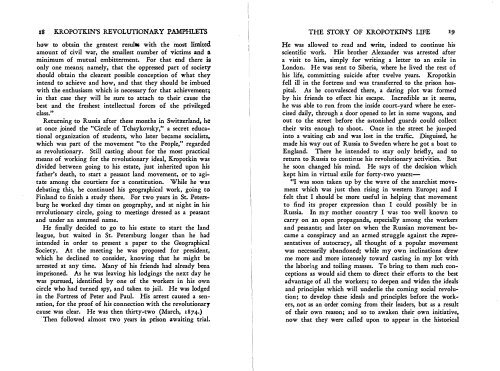Kropotkin's Revolutionary Pamphlets - Libcom
Kropotkin's Revolutionary Pamphlets - Libcom
Kropotkin's Revolutionary Pamphlets - Libcom
You also want an ePaper? Increase the reach of your titles
YUMPU automatically turns print PDFs into web optimized ePapers that Google loves.
18 KROPOTKIN'S REVOLUTIONARY PAMPHLETS<br />
how to obtain the greatest results with the most limited<br />
amount of civil W2r, the smallest number of victims and It<br />
minimum of mutual embitterment. For that end there is<br />
only one means; namely, that the oppressed part of society<br />
should obtain the clearest possible conception of what they<br />
intend to achieve and how, and that they should be imbued<br />
with the enthusiasm which is necessary for that achievement;<br />
in that case they will be sure to attach to their cause the<br />
best and the freshest intellectual forces of the privileged<br />
class."<br />
Returning to Russia after these months in Switzerland, he<br />
at once joined the «Circle of Tchaykovsky," a secret educational<br />
organization of students, who later became socialists,<br />
which was part of the movement "to the People," regarded<br />
as revolutionary. Still casting about for the most practical<br />
means of working for the revolutionary ideal, Kropotkin was<br />
divided between going to his estate, just inherited upon his<br />
father's death, to start a peasant land movement, or to agitate<br />
among the courtiers for a constitution. While he was<br />
debating this, he continued his geographical work, going to<br />
Finland to finish a study there. For two years in St. Petersburg<br />
he worked day times on geography, and at night in his<br />
revolutionary circle, going to meetings dressed as a peasant<br />
and under an assumed name.<br />
He finally decided to go to his estate to start the land<br />
league, but waited in St. Petersburg longer than he had<br />
intended in order to present a paper to the Geographical<br />
Society. At the meeting he was proposed for president,<br />
which he declined to consider, knowing that he might be<br />
arrested at any time. Many of his friends had already been<br />
imprisoned. As he was leaving his lodgings the next day he<br />
was pursued, identified by one of the workers in his own<br />
circle who had turned spy, and taken to jail. He was lodged<br />
in the Fortress of Peter and Paul. His arrest caused a sensation.<br />
for the proof of his connection with the revolutionary<br />
cause was clear. He was then thirty-two (March. 1874.)<br />
'Then followed almost two years in prison awaiting l:rial.<br />
THE STORY OF KROPOTJ{lN'S LIFE<br />
He was allowed to read and write, indeed to continue his<br />
scientific work. His brother Alexander was arrested after<br />
a visit to him, simply for writing a letter to an exile in<br />
London. He was sent to Siberia, where he lived the rest of<br />
his life, committing suicide after twelve years. Kropotkin<br />
fell ill in the fortress and was transferred to the prison hospital.<br />
As he convalesced there, a daring <br />
lot wa <br />
formed<br />
by his friends to effect his escape. IncredIble as it seems,<br />
he was able to run from the inside court-yard where he exercised<br />
daily, through a door opened to let in some wagons, and<br />
out to the street before the astonished guards could collect<br />
,their wits enough to shoot. Once in the street he jumped<br />
into a waiting cab and was lost in the traffic. Disguised, he<br />
made his way out of Russia to Sweden where he got a boat to<br />
England. There he intended to stay only briefly, and to<br />
return to Russia to continue his revolutionary activities. But<br />
he soon changed his mind. He says of the decision which<br />
kept him in virtual exile for forty-two years:-<br />
"1 was soon taken up by the wave of the anarchist movement<br />
which was just then rising in western Europe ; and 1<br />
felt that I should be more useful in helping that movement<br />
to find its proper expression than I could possibly be in<br />
Russia. In my mother country I was too well known to<br />
carry on an open propaganda, especially among the workers<br />
and peas.ants; and later on when the Russian movement became<br />
a conspiracy and an armed struggle against the representatives<br />
of autocracy, all thought of a popular movement<br />
was necessarily abandoned; while my own inclinations drew<br />
me more and more intensely toward casting in my lot with<br />
the laboring and toiling masses. To bring to them such conceptions<br />
as would aid them to direct their efforts to the best<br />
advantage of all the workers; to deepen and widen the ideals<br />
and principles which will underlie the coming social revolution;<br />
to develop these ideals and principles before the workers,<br />
not as an order coming from their leaders, but as a result<br />
of their own reason; and so to awaken their own initiative,<br />
now that they were called upon to appear in the historical

















